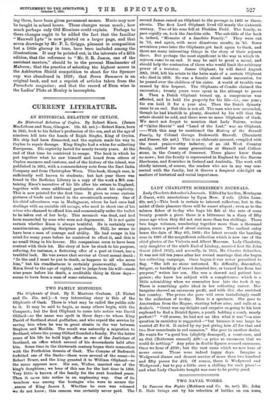TWO FAMILY HISTORIES.
The Oliphants of Gask. By E. Maxtone Graham. (J. Nisbet and Co. 21s. net.)—A very interesting story is this of the Oliphants of Gash. There is what may be called the public side to it. It may be said to begin, as many others begin, with the Conquest ; but the first Oliphant to come into notice was David Olifard—so the name was spelt in those days—to whom King David of Scotland stood godfather, and who repaid the service by saving him when he was in great straits in the war between Stephen and Matilda. The result was naturally a migration to Scotland, where the young Olifard founded a family. For the latter years of his life he held high office as one of the Justiciary of Scotland, an office which several of his descendants held after him. Some time in the thirteenth century began their connection with the Perthshire domain of Gask. The Comyns of Badenoch forfeited one of the Gasks—there were several of the name—to Robert Bruce, and the king granted it to William Oliphant—so the name appears now. His son, Walter, married one of the king's daughters ; we hear of this son for the last time in 1364. Very little is known of the family for the next hundred years. Then it came into notice in an unpleasing way. One of its trembers was among the hostages who were to secure the ansom of King James I. Whether he ever was released we do not know ; this ransom was certainly never paid. The second James raised an Oliphant to the peerage in 1463 or there- abouts. The first Lord Oliphant lived till nearly the sixteenth century. Two of his sons fell at Floclden Field. The family, to pass rapidly on, took the Jacobite aide. The sub-title of the book is, indeed, "Memoirs of a Jacobite Family." They were out in '15, and again, with more disastrous results, in '45. Some seventeen years later the Oliphante got back again to Gask, and there are many interesting things in the story of their sojourn there. But perhaps the most significant is the way in which th sojourn came to an end. It may be said to point a moral, and should help the contention of those who would limit the arbitrary power of a testator. James Oliphant, by will dated August 29th, 1846, left his estate to the heirs male of a certain Oliphant who died in 1699. He was a fanatic about male succession, for he passed over the children of his sister. A. world of trouble was caused by this bequest. The Oliphants of Condie claimed the succession ; twenty years were spent in the attempt to prove it. Then a Dutch Oliphant turned up, a compromise was effected, and he held the property for his life—i.e., one year ; his son held it for a year also. Then the Dutch dynasty came to an end. But this is not all. The man who now succeeded, though he had kinsfolk in plenty, directed by his will that the estate should be sold, and there were no more Oliphants of Gask. We must not forget to mention that Lady Nairne, writer of "Caller Herrin"' and "Land of the Leal," was an Oliphant. —With this may be mentioned the History of the Stawell Family, by Colonel George Dodsworth Stawell. (Darnioott and Pearce. 42s. net.) This is an elaborate account, compiled with the most praiseworthy industry, of an old West Country family, settled for many generations at Stawell and Cother- stone, in the County of Somerset. These places know them no more ; but the family is represented in England by the Barons Sherborne, and flourishes in Ireland and Australia. The work will chiefly interest, of course, The readers who are in any way con- nected with the family, but it throws a frequent side-light on matters of historical and social importance.






























































 Previous page
Previous page